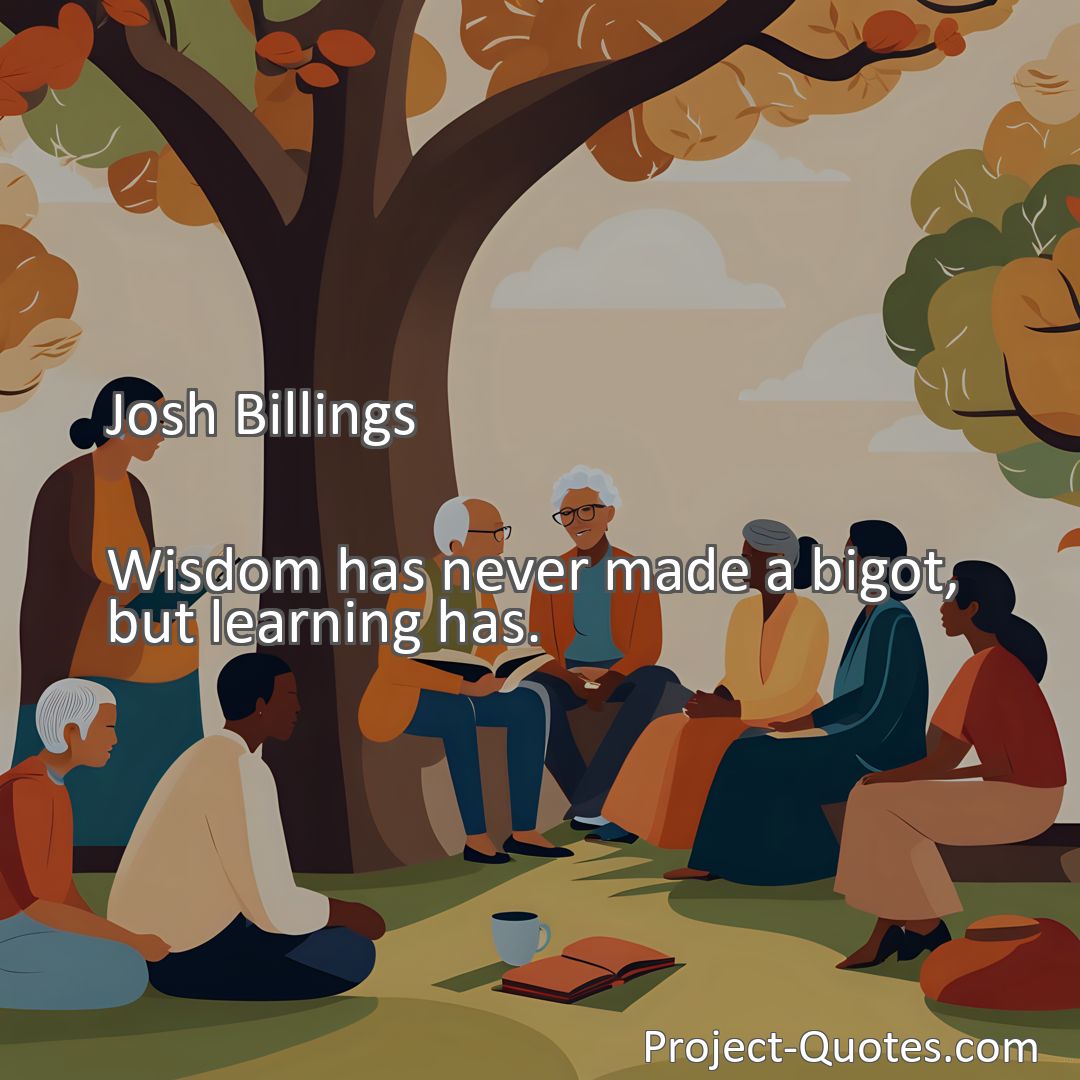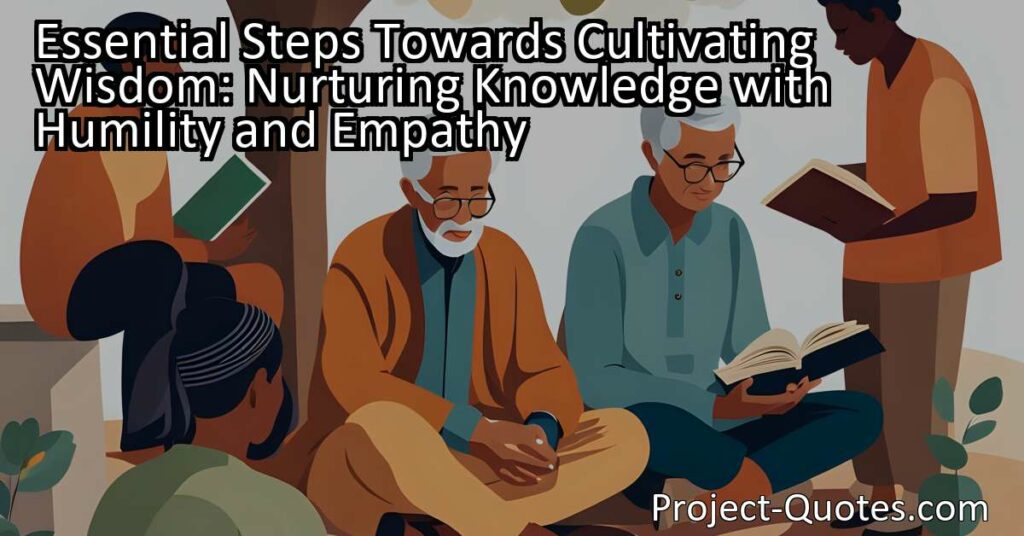Wisdom has never made a bigot, but learning has.
Josh Billings
Essential Steps Towards Cultivating Wisdom: Nurturing Knowledge with Humility and EmpathyCultivating wisdom is not limited to age or education level and goes beyond memorizing facts. It requires deep reflection, questioning biases, and seeking diverse perspectives. With humility, empathy, and an open mind, we can navigate the complexities of knowledge, embodying the true essence of wisdom.
Table of Contents
Meaning of Quote – Wisdom has never made a bigot, but learning has.
Have you ever wondered why some people become narrow-minded and intolerant as they acquire more knowledge and education? It is often said that wisdom has never made a bigot, but learning has. The renowned American humorist and lecturer, Josh Billings, once expressed this thought-provoking idea, shedding light on the negative consequences of learning without true wisdom.
When we hear the word “wisdom,” we may envision an elderly person with a long white beard, offering sage advice and deep insights. However, wisdom is not solely confined to the elderly; it is a quality that can be acquired by anyone, regardless of age or education level. Wisdom is not merely knowing facts or possessing a high IQ, but rather an understanding of oneself and the world around them, coupled with the ability to apply that knowledge in a compassionate and ethical manner.
On the other hand, learning encompasses the formal education we receive in schools, colleges, and universities. It involves acquiring knowledge and information about various subjects, expanding our intellectual horizons, and developing critical thinking skills. While education is undoubtedly crucial for personal and societal growth, it is not a guarantee of wisdom. In fact, as Josh Billings suggests, learning alone can sometimes lead to the emergence of bigotry and intolerance.
The reason for this paradox lies in the way we approach and interpret the information we acquire. Simply memorizing facts and figures without reflecting upon their impact on ourselves and others can result in a shallow understanding of the world. True wisdom, however, encourages us to delve deeper into the underlying meanings and implications of what we learn. It prompts us to question our preconceived notions and biases, encouraging empathy and openness towards perspectives and cultures different from our own.
One of the critical aspects of wisdom is the ability to see beyond our own limited perspective. It allows us to acknowledge that each person possesses unique experiences, beliefs, and values that shape their worldview. This understanding helps to prevent us from generalizing or stereotyping entire groups of people based on the actions or beliefs of a few individuals. Wisdom calls us to recognize the inherent worth and dignity of every human being, regardless of their background, religion, or ethnicity.
In contrast, learning without wisdom can lead to intellectual arrogance and an inflated sense of superiority. When we accumulate knowledge without considering its ethical implications, we may become intolerant of those who think differently or have opposing views. This phenomenon is often seen in history, where highly educated individuals have justified and perpetuated discrimination, social injustice, and even genocide. Without wisdom to guide us, we risk becoming bigoted and prejudiced.
To illustrate this, let us consider a hypothetical scenario. Imagine two individuals, both pursuing higher education in a prestigious university. Person A, while possessing a sharp intellect and a vast amount of knowledge, lacks wisdom. They excel in their field of study but rarely question their assumptions or engage in meaningful introspection. Person B, on the other hand, is not only knowledgeable but also possesses wisdom. They approach their education with humility, continually seeking to understand the broader implications of what they are learning.
As Person A delves deeper into their studies, their knowledge becomes a shield that protects them from alternative viewpoints. They become more rigid in their thinking, dismissing opposing perspectives as insignificant or erroneous. Consequently, their learning reinforces their pre-existing biases, fueling their intolerance towards different ideas or cultures. In contrast, Person B uses their education as a tool for personal growth, challenging their assumptions, and expanding their understanding. They seek out diverse perspectives and engage in respectful discussions with others, fostering an environment of inclusivity and open-mindedness.
In today’s era of unprecedented access to information, it is more vital than ever to cultivate wisdom along with our education. The internet provides a wealth of knowledge at our fingertips, but it also exposes us to an overwhelming amount of misinformation, propaganda, and polarizing viewpoints. Without the discerning eye of wisdom, we risk falling into echo chambers that reinforce our existing beliefs and lead us further away from empathy and compassion.
Fortunately, wisdom is not an innate trait that some are born with and others are not. It is a quality that we can nurture and develop throughout our lives. Engaging in introspection, practicing empathy, and seeking diverse perspectives are essential steps towards cultivating wisdom. Additionally, reflecting on our own values and beliefs and examining how they align with ethical principles can help us navigate the complex world of knowledge with more sensitivity and compassion.
In conclusion, while learning is undoubtedly valuable, it is wisdom that ensures the responsible and compassionate application of knowledge. Josh Billings eloquently expressed this idea when he stated that wisdom has never made a bigot, but learning has. As we engage in the pursuit of education and accumulate knowledge, let us not forget the importance of wisdom. May we strive to approach our learning with humility, empathy, and an open mind, thus embodying the true essence of wisdom.
I hope this quote inspired image brings you hope and peace. Share it with someone who needs it today!


